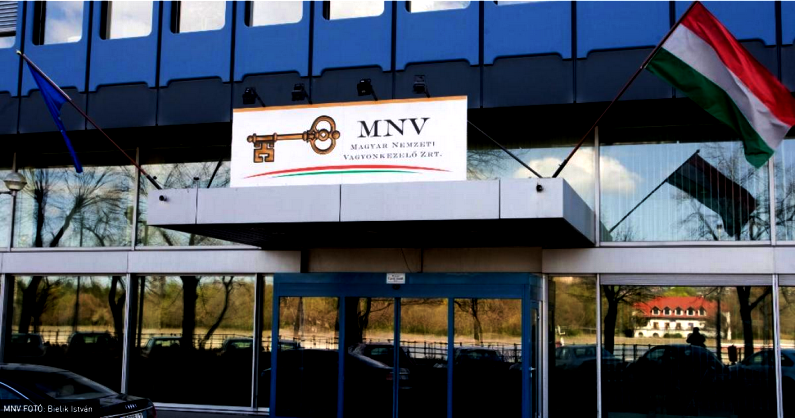The work of the Civil Justice Committee, founded by CÖF-CÖKA, basically involves the presentation of crimes committed during communism that have not yet been investigated and thus remained without consequences. Jr. Zoltán Lomnici is researching the methods and consequences of non-transparent asset management before 2010 based on the investigation of the State Audit Office.
In connection with the conversion, numerous investigations, proceedings and investigations were launched under the direction of the prosecutor's offices. One of these investigations was launched based on the initiative of the Civil Solidarity Foundation (CÖKA). CÖKA, heavily relying on the findings contained in the report of the State Auditor's Office, having detected a reasonable suspicion of a loss of billions of assets, filed a complaint in 2010 against ÁPV Zrt., KVI and NFA, as well as unknown perpetrators, for the offense of violating the accounting rules and negligent management of state assets. . He later extended the complaint to MNV Zrt. and the National Asset Management Council. The complaint was rejected by the Chief Prosecutor's Office of the Capital City regarding the negligent management of state assets, against which CÖKA filed a complaint.
Referring to the content of the audit report, the complaint also contained new facts, as a result of which the General Prosecutor's Office upheld the complaint and ordered an investigation. The complaint regarding the suspicion of violation of the accounting order is filed in the V. and XIII. It was transferred to the District Prosecutor's Office, and the Central Hungarian Regional Investigation Office of the VPOP was appointed as the executor of the investigation ordered there. The Investigative Office did not make a final decision, it only sent a notification that it was not conducting an investigation. In his notification, he referred to the fact that he had already conducted an investigation in a similar case in 2009, compared to which no new data emerged, so he does not consider it justified to investigate, although he investigated and closed it according to the contents of the document. The previous case referred to was initiated based on the complaint of a senior employee of the NFA regarding the suspicion of the crime of abuse of office.
During the investigation, the Investigative Office determined, based on the examined reports, the testimony of the interviewed witnesses and the expert opinion of an appointed auditor, that the accounting system of MNV Zrt. was in order, and that the predecessor organizations also operated in the same way, and in addition, it deemed the procedures of the Asset Management Council to be appropriate. Referring to the expert opinion, the position of the Investigation Office was that the only reason for what happened was that the legal regulations were not clear.
After that, the CÖKA made further observations, because according to its position, not only did it violate constitutional rights, that no legal remedy was provided against the relevant "decision", but it was also unacceptable, in their opinion, because, in their opinion, it violated the interests of all Hungarian citizens by ignoring it left out the system of guarantee requirements for enhanced protection of state property.
Based on the notification, it was also not considered clear how an expert who acted in a previous case could over-examine the contents of the State Audit Office's report and come to a different conclusion.
The decision made as a result of the investigation was essentially based on the testimony of the persons heard as witnesses in the case, whose impartiality could not have been investigated due to their direct involvement.
According to the whistleblower, it was ignored that the transitional provisions of the Property Act contained clear provisions regarding what specific tasks had to be performed in connection with the liquidation of organizations belonging to the defunct institutional system. This included, for example, the preparation of financial reports, asset balances and the supporting asset inventories with a closing date of December 31, 2007, the fulfillment of the obligations prescribed by accounting, taxation and other legislation, the preparation of information on ongoing cases, the compilation of the list of effective contracts, the at least taking the necessary measures related to private joint-stock companies with a majority state share in order for their management to comply with the legal provisions on the first day of the following year.
The report of the State Audit Office established, among other things, precisely in connection with these issues, that the tasks were not completed at all, or were not completed by the deadline. The violation of the law was therefore obvious, supported by the data of the audit report, on the basis of which the classification of the operation as regular is unacceptable. The lack of accountability is also unacceptable, since the Property Act specifically designated the person responsible for the implementation of the law in the person of the Minister of Finance. The same responsibility was defined in a previous government decree from 2006.
As part of the implementation of the law, the Minister of Finance received a firm instruction to terminate the three predecessor organizations on December 31, 2007. It is to be investigated how this could have taken place without the organization's asset balance sheet and asset inventory being prepared, as well as on what basis the company court registered MNV Zrt. without attaching an opening balance sheet as indicated earlier, and how the predecessor organizations could have been deleted by the company court closing balance sheets without. It should also be investigated that although MNV Zrt. in itself prepared a retrospective balance sheet during the investigation by the State Audit Office, and then amended it several times, how could it be accepted, especially considering that the State Audit Office does not consider it credible in its report.
The National Asset Management Council, which was appointed by the Minister of Finance in October 2007 and had personal connections with the management of the predecessor organizations, and whose responsibilities also included the implementation of the Property Act, did not take any measures to prepare the missing closing balance sheets and asset inventories, as did the Minister of Finance before.

photo: MNV/István Bielik
The omission is incomprehensible, considering that the predecessor organizations that had been operating continuously until then were capable of preparing the legal documents just as they had been in the previous years. However, the staff with the necessary expertise and experience were not instructed to carry out the work, and the Asset Management Council entrusted the coordination of the handover to external companies. The ledger extracts prepared monthly by the professional staff of the predecessor organizations in accordance with the requirements of the accounting rules would have provided a sufficient basis for the fast, accurate and precise handover. There were apparently no professional obstacles to the preparation of legal scales and inventories.
It was also to be investigated, based on the whistleblower's conviction, on whose instructions and under what circumstances the management of the predecessor organizations could be dismissed without accounting for the state assets entrusted to them. Based on the Accounting Act and the Property Act, the exempted managers had a clearly defined obligation to prepare reports and ensure bookkeeping and auditing.
However, they did not comply with this obligation, from which they were not legally exempted based on the available data, and they were not held accountable. As a result of the unpunished failure of the measures to date, the situation arose that the assets managed by the predecessor organizations were not included in the annual reports of budgetary institutions and other organizations, so they could end up outside the public finances. In any case, based on the reports of the SAO, the whistleblower established that state assets had become opaque and uncontrollable. MNV Zrt. did not make the data necessary for the audit available even during the Audit Office audit, thus disturbing the audit in an extraordinary way, according to the report of the State Audit Office.
During the audit, MNV Zrt. first established the total amount of the opening balance sheet, which was prepared late compared to the deadline and the company court registration, at HUF 1,771 billion, and then changed it to HUF 15,966 billion during the audit. The first official balance sheet was therefore misleading and contained false data.
In relation to the existing contracts of the predecessor organizations, the circumstances of the fact that more than 3,500 contracts disappeared during the handover cannot be found, and the contracts with a value not exceeding HUF 5 million were not made public, which violated the fundamental right to access data of public interest.
In addition, corrections were made to thousands of contracts in the contract file of the NFA regarding rental fees. MNV Zrt. did not take into account the increase in rental fees and did not invoice the increased portion of the fee, thus the Hungarian state and the budget lost significant revenues.
Summary
According to the position of the State Audit Office, in the end, the strategic and legal regulation of the established asset management system is clear, unambiguous and sufficient to enforce the legislative intentions, and whether the practice of operation ensured the fulfillment of goals and expectations related to asset management. Was the organizational structure of MNV Zrt. fully regulated, was it in accordance with the tasks to be performed, the provisions of the Property Act and other legislation. Were the interventions and decisions of the decision-makers effective, in accordance with the rules and expedient, was the transparency of the decision-making process ensured, the measurement of its impact, and the determination of responsibility.
The strategic and legal regulation of the created asset management system is unclear and contradictory at several points, its provisions are incomplete, resulting in unresolved legal disputes. In 2008, the strategic and legal regulations were not sufficient to enforce the legislative intentions, the Vtv. his goals were not realized. The reasons for the non-fulfillment of the general goals set in the property law are the unreasonably fast introduction of the property law, inaccuracies in the property law and the executive decrees, deficiencies in the foundation, the so-called can be traced back to the circumstances of the termination of predecessor organizations, the lack of precise definition of tasks and responsibilities, the decisions of decision-makers not made in time, and the delay of decisions due to clarifying differences of opinion. Its consequences were a large number of tasks that were not completed or were not completed by the legal deadline, as well as non-compliance with the legislation There were no consequences for the non-fulfillment of the tasks, the non-compliance with the legal and agreed deadlines, the shortcomings also resulted in avoidable costs and payments. Already in 2008, both the ÁSZ and the EC drew attention to the deficiencies, they were known to the decision-makers.
The organizational structure of MNV Zrt. was not comprehensively regulated, on the one hand, because the SZMSZ in force until November 12, 2008 was incomplete in defining the powers of decision and responsibility, and was not in line with the tasks to be performed, and on the other hand, the regulations prescribed in some laws and internal instructions were not were completed. The joint, coordinated regulation of the scope of tasks, influence and responsibility was not realized either in the Vtv. or in the SZMSZ, which made it difficult and debatable to clearly establish responsibility. The joint responsibility of the decision-makers can be raised for the omissions. The transparency of the decision-making processes was partially ensured, the decision-making processes in some cases did not build on each other, and in several cases the decisions made did not contain the exact subject of the decision, usually did not refer to the decision-making authority (e.g. own/delegated), and the decisions did not explain justification.
The impact of the decisions was not measured. The practice of the regulatory and operational system created for MNV Zrt. did not result in an improvement in efficiency, because the legislation was not fully enforced in the new asset management system, the operation of the organization and some regulations were not in harmony, the decision-making processes in some cases were not based on each other, and some decisions they were not consistent with each other. The control system did not work fully, and the revealed problems were not resolved even after a delay of several months. Thus, the practice of the new asset management system did not ensure the realization of the goals related to asset management.
Author: Jr. Zoltán Lomnici is a constitutional lawyer
(Cover image: police.hu)
The full scope of the study can be read here: Zoltán Lomnici Jr. - Where did the public wealth go?













